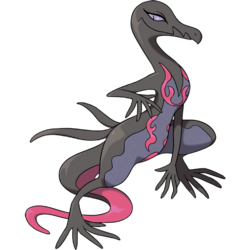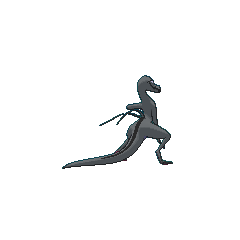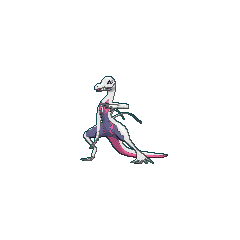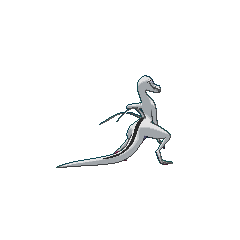From Bulbapedia, the community-driven Pokémon encyclopedia.
|
|
| Line 50: |
Line 50: |
|
| |
|
| ===Minor appearances=== | | ===Minor appearances=== |
| | {{clear}} |
|
| |
|
| ==In the manga== | | ==In the manga== |
Revision as of 04:44, 23 February 2018
Salazzle (Japanese: エンニュート Ennewt) is a dual-type Poison/Fire Pokémon introduced in Generation VII.
It evolves from a female Salandit starting at level 33.
Biology
Salazzle is a dark grey Pokémon resembling a salamander or a lizard. It has a thin dark grey body with a purple underside. Its head is dark grey with purple eyes and slit pupils. There are several tooth-like protrusions on the lower jaw. Salazzle's body has three pink markings, one on the chest, which splits to form a 'U' shaped design, and the other two on the abdomen, forming two 'f'-shaped patterns. Salazzle has a long, dark grey tail with a pink underside and two protrusions come out form the tail's base. It has hands and feet with five digits each. These digits are long and thin. Salazzle is a female-only species.
It creates a reverse harem with the male Salandit it lives with. It attracts Salandit with its pheromones and forces them to serve it, punishing those unable to give it food with a flame-spewed slap.
In the anime
Major appearances
Salazzle debuted in SM053, under the ownership of Lusamine. With both Salazzle and her Trainer under the influence of a Nihilego, Kiawe volunteered to stay behind and battle Salazzle while Ash and the others continued their pursuit atop Nebby.
Minor appearances
In the manga
In the Pokémon Adventures manga
Salazzle debuted in PASM11. Two were used by some Team Skull Grunts to attack Sun and his friends at Memorial Hill.
Plumeria's Salazzle first appeared in the Sun & Moon arc, attacking Gladion and his Type: Null.
In the TCG
- Main article: Salazzle (TCG)
Game data
Pokédex entries
| This Pokémon was unavailable prior to Generation VII.
|
| Generation VII
|
|
| Sun
|
For some reason, only females have been found. It creates a reverse harem of male Salandit that it lives with.
|
| Moon
|
Filled with pheromones, its poisonous gas can be diluted to use in the production of luscious perfumes.
|
| Ultra Sun
|
Salazzle lives deep in caves and forces the Salandit it has attracted with its pheromones to serve it.
|
| Ultra Moon
|
It punishes Salandit that couldn't bring it food with a fierce slap of its flame-spewing palm.
|
|
|
Game locations
| This Pokémon was unavailable prior to Generation VII.
|
|
|
In side games
In events
| Games
|
Event
|
Region
|
Location
|
Level
|
Distribution period
|
| SM
|
Clovis Salazzle
|
American region
|
Online
|
50
|
August 14 to December 4, 2017
|
| SM
|
Clovis Salazzle
|
PAL region
|
Online
|
50
|
August 18 to December 4, 2017
|
Held items
Stats
Base stats
| Stat
|
Range
|
| At Lv. 50
|
At Lv. 100
|
68
|
|
128 - 175
|
246 - 340
|
64
|
|
62 - 127
|
119 - 249
|
60
|
|
58 - 123
|
112 - 240
|
111
|
|
104 - 179
|
204 - 353
|
60
|
|
58 - 123
|
112 - 240
|
117
|
|
109 - 185
|
215 - 366
|
Total: 480
|
Other Pokémon with this total
|
- Minimum stats are calculated with 0 EVs, IVs of 0, and (if applicable) a hindering nature.
- Maximum stats are calculated with 252 EVs, IVs of 31, and (if applicable) a helpful nature.
|
Type effectiveness
| Under normal battle conditions in Generation IX, this Pokémon is:
|
|
|
|
|
|
|
|
|
|
|
|
|
Learnset
|
|
|
|
- Bold indicates a move that gets STAB when used by Salazzle
- Italic indicates a move that gets STAB only when used by an Evolution of Salazzle
|
|
|
|
|
- Bold indicates a move that gets STAB when used by Salazzle
- Italic indicates a move that gets STAB only when used by an Evolution of Salazzle
|
|
|
|
|
- Moves marked with an asterisk (*) must be chain bred onto Salazzle in Generation VII
- Moves marked with a double dagger (‡) can only be bred from a Pokémon who learned the move in an earlier generation.
- Moves marked with a superscript game abbreviation can only be bred onto Salazzle in that game.
- Bold indicates a move that gets STAB when used by Salazzle
- Italic indicates a move that gets STAB only when used by an Evolution of Salazzle
|
|
|
|
|
- A black or white abbreviation in a colored box indicates that Salazzle can be tutored the move in that game
- A colored abbreviation in a white box indicates that Salazzle cannot be tutored the move in that game
- Bold indicates a move that gets STAB when used by Salazzle
- Italic indicates a move that gets STAB only when used by an Evolution of Salazzle
|
|
|
|
|
- Bold indicates a move that gets STAB when used by Salazzle
- Italic indicates a move that gets STAB only when used by an Evolution of Salazzle
|
|
|
|
|
- A superscript level indicates that Salazzle can learn this move normally in Generation VII
- Bold indicates a move that gets STAB when used by Salazzle
- Italic indicates a move that gets STAB only when used by an Evolution of Salazzle
|
Side game data
Evolution
Sprites
| This Pokémon was unavailable prior to Generation VII.
|
|
|
Trivia
Origin
Salazzle appears to be based on a salamander and lizards of the Teiidae family, also known as "whiptails". Certain whiptail species have a mostly female population, some species even being female exclusive, one of which is the New Mexico whiptail. It may also be partially based of fire belly newts.
Name origin
Salazzle may be a combination of salamander and dazzle or sizzle.
Ennewt may be a combination of 炎 en (flame) or 艶 en (bewitching) and newt.
In other languages
| Language
|
Title
|
Meaning
|
 Japanese Japanese
|
エンニュート Ennewt
|
From 炎 en or 艶 en and newt
|
 French French
|
Malamandre
|
From mal and salamandre
|
 Spanish Spanish
|
Salazzle
|
Same as English name
|
 German German
|
Amfira
|
From Amphibie and fire
|
 Italian Italian
|
Salazzle
|
Same as English name
|
 Korean Korean
|
염뉴트 Yeomnyuteu
|
From 염 (炎) yeom or 염 (艷) yeom and newt
|
 Mandarin Chinese Mandarin Chinese
|
焰后蜥 Yànhòuxī
|
From 焰 yàn, 艷后 yànhòu, and 火蜥蜴 huǒxīyì
|
 Cantonese Chinese Cantonese Chinese
|
焰后蜥 Yihmhauhsīk
|
From 焰 yihm, 艷后 yihmhau, and 火蜥蜴 fósīkyihk
|
|
|
|
| More languages
|
 Russian Russian
|
Салаззл Salazzl
|
Transcription of English name
|
|
|
|
Related articles
External links

|
This Pokémon article is part of Project Pokédex, a Bulbapedia project that aims to write comprehensive articles on each Pokémon species, as well as Pokémon groups and forms.
|

 For other sprites and images, please see Salazzle images on the Bulbagarden Archives.
For other sprites and images, please see Salazzle images on the Bulbagarden Archives.




















